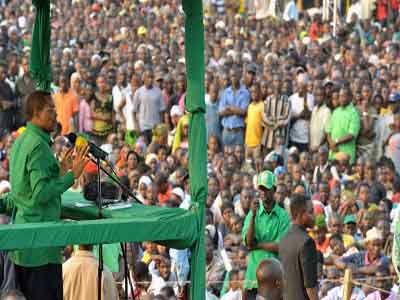
Campaigning for presidential elections in Tanzania began on Sunday, with the race seen as the tightest in the east African nation’s history.
The ruling Chama Cha Mapinduzi (CCM) party launched its campaign for the October 25 polls with a massive rally in the economic capital of Dar es Salaam, with its candidate promising to put an end to rampant corruption.
“I know that you need an end to corruption, embezzlement, theft and abuse of office. I profoundly promise you all that will soon be history,” the CCM’s candidate, former works minister John Magufuli, told party supporters.
“Upon my election I am going to spearhead the formation of a special court to deal with the corrupt, economic saboteurs and embezzlers,” he vowed, pledging an “end to injustice and the harassing of innocent civilians”.
The ruling CCM party has dominated politics since modern Tanzania was formed in 1964, and currently has two-thirds of seats in parliament.
Magufuli, 55, is hoping to succeed President Jakaya Kikwete, who was also at the rally and backed the ruling party candidate as “a clean, honest and humble person.”
“When he went around seeking the nomination he was not throwing money around,” Kikwete said, promising the country that it would be in “safe hands”.
Kikwete cannot stand again after serving the two term limit.
The country’s four main opposition parties have chosen ex-prime minister Edward Lowassa, who defected last month from the CCM, as their joint presidential candidate.
Lowassa, 61, was the east African country’s prime minister between 2005 and 2008. He had tried to win the CCM nomination, and was widely seen as a frontrunner among 42 candidates, but he lost out to Magufuli.
The opposition — who are seen as posing a more serious challenge with four of the key parties having nominated a joint candidate — are expected to hold their first major rallies next weekend.
The CCM is also seen as having been weakened by internal splits and a string of graft scandals.
Tanzania, with over 50 million people, is east Africa’s most populous country, with economic growth of more than seven percent, according to the World Bank.
Despite advances, the country remains very poor by regional and international standards, the World Bank says, with agriculture the key sector, providing a quarter of gross domestic product and employing three-quarters of the population.



